The Vancouver Playhouse
DUE TO PERFORMER ILLNESS, THIS CONCERT HAS BEEN CANCELLED.
For details on the replacement show – Bach Cello Suites no.’s 1, 2, and 6 with Elinor Frey, click here. If you hold tickets to The Luminous Hour, you DO NOT have to change your ticket to attend the Bach Cello Suites on January 12.
For details on refunding your ticket(s), please contact our office.
Artists: Reginald Mobley, Alexander Weimann & Players from the Pacific Baroque Orchestra and special guests
Run time: 70 minutes
Reginald Mobley, a 2023 Grammy Awards and 2023 Classical Music Awards Nominee, stars in Purcell songs, Jazz standards by Duke Ellington and George Gershwin, and a world premiere – Farewell Songs by Edward Top. Mobley’s background in the gospel and jazz worlds, combined with his classical training and skillful Baroque performance make for a unique programme.
“Farewell Songs presents an alternate history of true exchange between ancient Chinese instruments and the early-music practice of the European Baroque ensemble on the shores of Canada in 2024. The texts are taken from Tang dynasty poets Mèng Hàorán and Wang Wei, are freely interpreted and translated into English by the composer. Earlier translations of these texts were used by Gustav Mahler in his song cycle Das Lied von der Erde. Part of the idea in the Farewell Songs is how French and German translations (as available to Mahler 120 years ago), numerous English versions, and now a direct translation of the original Chinese, have created a multiplicity of references and interpretations of the poems. The original Chinese text is narrated by erhu player Lan Tung during the performance, bringing it back to the ‘purity’ of its original intentions. Similarly, the music oscillates between Chinese and Baroque music, and contemporary musical elements; between the accuracy of historic practice and the freely creative (re)-interpretation of it.”- Edward Top, Vancouver, November 2023
There will be a pre-concert talk at 6:45 p.m. with Alexander Weimann and Edward Top, hosted by Suzie LeBlanc
This concert is generously sponsored by the RPC Family Foundation and Simon Murphy
PROGRAMME
Henry Purcell
O Solitude
Music for a while
An Evening Hymn
Rodney Sharman
She Walks in Beauty
Edward Top
Farewell Songs* WORLD PREMIERE
Jazz standards
Strange Fruit
So in Love
Pick yourself up
In my solitude
Autumn Leaves
PROGRAMME NOTES
“Musick for a while / Shall all your cares beguile . . . ”: when Henry Purcell wrote his incidental music for Oedipus, he no doubt knew how heavy the “cares” treated by the play would turn out be. Theatre-goers of the late seventeenth century had a taste for sensation and spectacle, and John Dryden and Nathaniel Lee (the adapters of Sophocles’ great tragedy) ensured that the remaining acts following Purcell’s music held psychological turmoil and bloody death in store for most of the characters. In spite of all that, though, Purcell’s music does what it says: it provides an interlude, a place of rest, comfort and light, even while it holds the darkness in view. It seems appropriate that English musicians of the time referred to the kind of repeating bass line on which this song is built—and which Purcell cultivated so brilliantly—as a “ground,” because it gives listeners something solid to hold onto or stand on. It is a changing landscape; Purcell’s ability to move almost unnoticed to other key areas and to weave the vocal line in endlessly new ways around the bass makes sure of that. But is also one that remains reassuringly and radiantly the same—for a while.
Listening to Purcell’s ground bass songs is like entering a golden moment that seems like it might go on forever and that you wish would never end. In contrast to the predominantly straightforward progressions that were the stock-in-trade of musicians across baroque Europe, Purcell often designed grounds that were extended and tangled while remaining entirely clear in their overall direction. This reflects the songs’ emotional complexity: there is a gentle irony in the fact that “O solitude,” his melancholy but tender hymn to the consolations of being alone, was first published in a 1687 collection entitled Comes Amoris: Or The Companion of Love. (The printers who assembled the collection may have been aware that their title contained a further musical pun: comes had by then entered the language of compositional theory as a name for the musical “companion” or “follower” that answers the first statement of a theme (“dux,” or “leader”) in an imitative composition.) Music, it is implied, provides a time and space for companionship all of its own, even within “solitude.” “An Evening Hymn,” published the following year as the first piece in a collection of sacred music printed by Henry Playford, takes up the theme of a relationship that transcends seclusion, reaffirmed quietly and ecstatically in the moments before sleep.
Rodney Sharman’s She Walks in Beauty has a similar twilight quality. An internationally recognized composer and a champion for new music in Canada, Sharman has said that he thinks about composition as the exploration of “sonic images”; here, he surely has in mind the ethereal play of “dark and bright” depicted by Byron’s 1814 love lyric. Sharman originally wrote She Walks in Beauty as a lute song for the experimental soprano Catherine Fern Lewis, another passionate advocate for Canadian contemporary music. He prepared an adaptation for countertenor voice in 2016 specially for Reginald Mobley.
The mixed glow of old and new captured by Sharman’s work can also be seen in this programme’s blend of baroque and jazz music, two styles that seem sometimes like soul siblings spanning the centuries. Although the products of very different histories, both are harmonically driven, virtuosic but also intensely collaborative, motivated by newfound expressive capabilities of voices and instruments alike. Much as jazz musicians gather a repertoire of “licks” that can be recombined on the spur of the moment, baroque players and composers produced collections of diminution patterns—passaggi—and contrapuntal formulae with which to turn the simplest melodic motions into breathtaking improvisatory flourishes. And whereas musicians of the sixteenth, seventeenth and eighteenth centuries might rely on familiar progressions like the romanesca, bergamasca, passamezzo, and ciaccona as common ground for improvisation, jazz has its own long list of standards, drawn from the blues tradition and the show tunes of the Great American Songbook as well as from the works of jazz composers.
All extensively recorded and reimagined, this programme’s jazz selections range from witty numbers by Jerome Kern and Dorothy Fields (“Pick Yourself Up,” introduced by Fred Astaire and Ginger Rogers in the 1936 movie Swing Time) and Cole Porter (“So in Love,” a sultry hit from the Shakespeare-inspired musical Kiss me, Kate) to blues-inspired, era-defining masterpieces like “Strange Fruit” and Duke Ellington’s “(In my) Solitude,” both of which were powerfully recorded by Billie Holiday. “Strange Fruit” (written by Abel Meeropol, a child of Russian Jewish immigrants who wrote under the pen name “Lewis Allen”) is such an unflinching indictment of racial violence that Holiday’s decision to record it attracted an institutional backlash that changed the course of her life and career; it nevertheless became a fixture of her performances. Joseph Kozma’s “Autumn Leaves,” first heard as Les feuilles mortes with lyrics by the poet Jacques Prévert, is perhaps one of the greatest standards of all and also one of the most baroque in design; it is built on the same recurring harmonic patterns (or sequences) beloved of composers like Antonio Vivaldi.
The centrepiece of this concert, the world premiere of Edward Top’s Farewell Songs, reimagines another complex story of cultural encounter. Born in the Netherlands, Top has served as composer-in-residence for the VSO (2011-2014), as Head of the Composition Department at the Vancouver Academy of Music and as a lecturer in composition at UBC. Farewell Songs reflects the powerful presence of East Asian culture in Top’s life and music, drawing on classic poetry from the Tang dynasty (618-907) and the sounds of the Chinese erhu, a two-stringed fiddle with similarly ancient roots. Top describes this special commissioned work:
“The Farewell Songs present an alternate history of true exchange between ancient Chinese instruments and the early-music practice of the European Baroque ensemble on the shores of Canada in 2024. In addition, a countertenor sings texts from Tang dynasty poets Mèng Hàorán and Wang Wei. These texts are freely interpreted and translated into English by the composer. Earlier translations of these texts were used by Gustav Mahler in his song cycle Das Lied von der Erde. Part of the idea in the Farewell Songs is how French and German translations (as available to Mahler 120 years ago), numerous English versions, and now a direct Google translation of the original Chinese, have created a multiplicity of references and interpretations of the poems. The original Chinese text is narrated by erhu player Lan Tung during the performance, bringing it back to the ‘purity’ of its original intentions. Similarly, the music oscillates between Chinese and Baroque music, and contemporary musical elements; between the accuracy of historic practice and the freely creative (re)-interpretation of it.” (Edward Top, Vancouver, November 2023)
- Connor Page
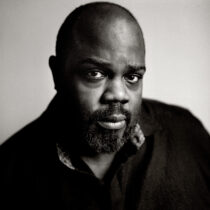
Reginald Mobley, countertenor
Noted for his ‘shimmering voice’ (BachTrack), American countertenor Reginald Mobley is highly sought after for the baroque, classical and modern repertoire.
Reginald leads a very prolific career on both sides of the Atlantic. In the United States, where he resides, he became the first ever programming consultant for the Handel & Haydn Society following several years of leading H&H in his community engaging Every Voice concerts. He also holds the position of Visiting Artist for Diversity Outreach with the Baroque ensemble Apollo’s Fire, and is a regular guest with Cantata Collective, Musica Angelica, Agave Baroque, Charlotte Bach Akademie, Seraphic Fire, Quodlibet, Pacific Music Works, Bach Collegium San Diego, San Francisco Early Music Society and Philharmonia Baroque Orchestra.
Recent engagements have included concerts and recordings with the Chicago Symphony Orchestra, Opera Lafayette, Blue Heron, Chatham Baroque, Washington Bach Consort, Atlanta Baroque Orchestra and Early Music Seattle. Future highlights include Carmina Burana with the Chicago Symphony Orchestra, Messiah with the New York Philharmonic and Pittsburgh Symphony Orchestras, a debut at Carnegie Hall with Orchestra St Luke’s and at the Walt Disney Hall in Los Angeles.
In Europe, Reginald has been invited to perform with the OH! (Orkiestra Historycsna) in Poland, Vienna Academy in Austria (Musikverein), Musée d’Orsay in Paris, Royal Scottish National Orchestra, Academy of Ancient Music, City of Birmingham Symphony Orchestra, Balthasar Neumann Chor & Ensemble, Bach Society in Stuttgart, Holland Baroque Orchestra and in the autumn of 2021, he performed the role of Ottone in L’incoronazione di Poppea in Geneva, MUPA and Teatro di Vicenza in a European tour with The Budapest Festival Orchestra. He has also extensively toured with the Monteverdi Choir and Orchestra under the baton of John-Eliot Gardiner, and more recently performed a series of English music programmes in Germany with the Freiburger Barockorchester under the leadership of Kristian Bezuidenhout.
His recordings have been received with great critical acclaim, most recently American Originals with Agave Baroque ensemble, recorded with Acis Productions, which has been nominated for a GRAMMY Award, following A Lad’s Love with Brian Giebler on BRIDGE 9542 label. Reginald features on several albums with the Monteverdi Choir and Sir John Eliot Gardiner, including a recording of Bach’s St Matthew Passion and Magnificat, where Reginald ‘encapsulates whimsical pathos’ (Classical Music Magazine) His solo recording debut with ALPHA Classics will be released in June 2023. Reginald’s work has earned him both a 2023 Grammy Awards and 2023 Classical Music Awards Nomination.
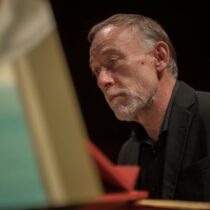
Alexander Weimann, director
Alexander Weimann is one of the most sought-after ensemble directors, soloists, and chamber music partners of his generation. After travelling the world with ensembles such as Tragicomedia, Cantus Cölln, the Freiburger Barockorchester, Gesualdo Consort and Tafelmusik, he now focuses on his activities as Music Director of the Pacific Baroque Orchestra in Vancouver, Music Director of the Seattle Baroque Orchestra, and regular guest conductor of ensembles including the Victoria Symphony, Symphony Nova Scotia, Arion Baroque Orchestra in Montreal and the Portland Baroque Orchestra.
Alex was born in Munich, where he studied the organ, church music, musicology (with a summa con laude thesis on Bach’s secco recitatives), theatre, mediæval Latin, and jazz piano, supported by a variety of federal scholarships. From 1990 to 1995, he taught music theory, improvisation, and Jazz at the Munich Musikhochschule. Since 1998, he has been giving master classes in harpsichord and historical performance practice at institutions such as Lunds University in Malmö, the Bremen Musikhochschule, the University of California (Berkeley), Dartmouth College (New Hampshire), McGill University, Université de Montréal, and Mount Allison (New Brunswick). He now teaches at the University of British Columbia and directs the Baroque Orchestra Mentorship Programme there. He has received several JUNO and GRAMMY Award nominations – most recently, for the album Nuit Blanches with the Pacific Baroque Orchestra and Karina Gauvin.
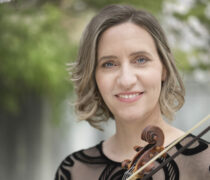
Chloe Meyers, violin
Violinist Chloe Meyers is a regular guest leader and orchestra member of baroque ensembles all over North America. She has worked with ensembles including Les Violons du Roy, Tafelmusik, the Montreal Symphony Orchestra, Ensemble Les Boréades, the Theatre of Early Music, Les Idées Heureuses and Les Voix Baroques. She recently joined the Pacific Baroque Orchestra as concertmaster and will continue to play principal second with Arion Baroque Orchestra in Montreal. Most recently she played first violin on a Juno Award winning recording of Handel arias featuring Canadian soprano Karina Gauvin on the Atma Classique label.
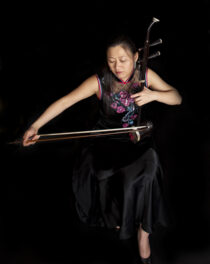
Lan Tung, erhu
Crossing between new music, improvised music, and world music scenes, Taiwanese Canadian Lan Tung is the founder, artistic director, and resident composer of various cross-cultural projects, such as the JUNO nominated Orchid Ensemble, the Sound of Dragon Ensemble, Vancouver Erhu Quartet, and Proliferasian. She is the founder/artistic director of the biennial Sound of Dragon Music Festival that showcases innovative projects and facilitates collaboration. She co-leads Naadaleela Ensemble (fusing Taiwanese, Chinese, Indian, and Persian traditions with jazz and other influences) with Curtis Andrews, collaborates with cellist Marina Hasselberg in Have Bow Will Travel, with Ron Samworth and Neelamjit Dhillon in Birds of Paradox, with Liron Man and Jonathan Bernard in Lalun. Lan performs regularly with the Vancouver Inter-Cultural Orchestra, Sounds Global Ensemble, BC Chinese Music Ensemble, and the NOW Orchestra (improvised music). Lan has toured internationally and appeared as a soloist with Orchestre Metropolitain (Montreal) and Symphony Nova Scotia, and as a soloist/composer with Vancouver Symphony Orchestra, Turning Point Ensemble (Vancouver & Taiwan), Upstream Ensemble (Halifax), Vancouver Inter-Cultural Orchestra (Canada & US), Atlas Ensemble (Amsterdam & Helsinki), and Little Giant Chinese Chamber Orchestra (Taiwan & China).
Lan Tung’s music often experiments with contradictions by fusing materials from different traditions and genres, such as the sense of breath/space from Chinese music, the rhythmic intricacy from Indian influence, the precision in contemporary compositions, the space for interpretation with graphic notations, as well as melodic or textural improvisation. Lan’s compositions and performances are released on numerous CDs, winning International Independent Music Awards and multiple nominations by JUNO, Canadian Independent Music Awards, Canadian Folk Music Awards, and Western Canadian Music Awards.
Lan has worked in various interdisciplinary projects as a composer, performer, and/or producer. Past collaborators included Wen Wei Dance, TomoeArts (dance theatre), Aeriosa (aerial dance, Chimerik (multimedia), Moving Dragon Dance, Mozaico Flamenco Dance, Pangaea Arts (theatre), and Flicker Arts Collaboratory (media arts). In contemporary music, Lan has premiered numerous chamber, solo, orchestral and electroacoustic compositions, working with Canadian composers Tim Brady, John Oliver, Hope Lee, Edward Top, Moshe Denburg, Mark Armanini, Jin Zhang, Janet Danielson, Barry Truax, Dorothy Chang, Steve Chatman, Rui Shi Zhuo, Jordan Nobles, Neil Weisensel, Paul Plimley, Yawen Wang, Farshid Samandari, Michael Vincent, Nova Pon, and Grace Lee.
Lan started to learn the erhu at the age of 10 and went to the Chinese Music Department at Taiwan’s Chinese Cultural University. With the support of the Canada Council for the Arts and the BC Arts Council, she has studied graphic score with Barry Guy in Switzerland, improvisation with Mary Oliver in Amsterdam, Hindustani music with Kala Ramnath in India, Uyghur music with Abdukerim Osman in Xinjiang, and Mongolian horsehead fiddle with Bayar in Hohhot, China; as well as making multiple trips to perform with improvising musicians in Germany, Switzerland, and the Netherlands. At the Vancouver Creative Music Institute (2007-2009), she has studied and performed with Han Bennink (Holland), Barry Guy, Evan Parker, John Butcher (UK), Francois Houle, Paul Plimley…etc.
Lan has been a featured soloist at Musica Nova Festival (Helsinki), National Concert Hall (Taiwan), Festival de Morelia (Mexico), Place des Arts (Montreal), and the Chan Centre for the Performing Arts (Vancouver); and as a leader of her ensembles at Esplanade – Theatre on the Bay (Singapore), the Kennedy Centre for the Performing Arts (DC, USA), National Arts Centre (Ottawa), Festival International Musique Actuelle Victoriaville, Festival Miami, Vancouver International Jazz Festival, Vancouver International Folk Festival, Ding Yi Chinese Chamber Music Festival (Singapore), Ottawa Folk Festival, Ottawa Jazz Festival..etc.
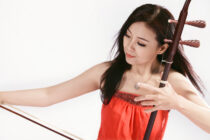
Jun Rong, erhu
Jun Rong is an Erhu instructor at Capilano University and teaches the very first Erhu Major in Vancouver. She is also the Vancouver alumni association vice president of the China Conservatory of Music. Jun learned Erhu from her father ever since she was a child. She was admitted into the China Conservatory of Music high school at the age of 12, under Qing Jiang (daughter of Mr. Fengzhi Jiang master and pioneer of Erhu), Churong He, and Professor Zunlian Zhang’s tutelage. She then was admitted into the China Conservatory of Music undergraduate program under professor Dewei Cao’s apprenticeship. During school, she majored in Erhu with a minor in Guzheng and piano. Upon graduation, she received a bachelor’s degree with honours from the China Conservatory of Music and successfully held a Erhu solo concert. After graduation, Jun worked at the China Opera and Dance Orchestra as an Erhu soloist and band performer. Jun, along with the China Opera and Dance Orchestra, performed in multiple countries across the world.
After moving to Canada, Jun continued her Erhu career in Vancouver’s growing multi-cultural music scene. She has participated in large-scale symphony concerts, chamber concerts, film dubbings, CD recordings, music festivals, and Canadian national television and radio. Her musical skills gained wide recognition from industry professionals, and audiences from all cultures are captivated by her performances. In addition to playing traditional Chinese repertoire, Jun has made many cross-cultural collaborations. As part of the Erhu and Harp Duet, Jun collaborated with local harpists to develop a unique music style combining Chinese and Western music. The Erhu and Harp Duet performed at many festivals and were invited to perform at the Vancouver World Harp Convention opening ceremony. Jun also played Gaohu and Erhu in the Vancouver Inter-Cultural Orchestra.
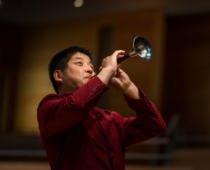
Zhongxi Wu, suona
Zhongxi Wu was born in Heilongjiang Province in northeastern China, and is from a family of traditional musicians. His father and elder brother began teaching him reed instruments when he was eight years old. Zhongxi later graduated from the Heilongjiang College of Performing Arts, and has performed as a soloist in Japan, Hong Kong, and the many cities in the U.S.A. including New York, Washington D.C. He was a guest artist on the sheng at the Carrefour mondial de l’accordeon in Quebec in 2008. In 2012, he was appointed as a member of the China Nationalities Orchestra Society.
As a resident of Vancouver, B.C., he has taught sheng, guanzi and suona, performed many solos and ensemble pieces, traditional and new music works, recorded CD’s with BCCMA and other groups, and performed at the Vancouver Jazz Festival. He has also learned to play the Scottish Highland Bagpipes and plays regularly with the Delta Police Pipe Band , with whom he has toured to England to perform for the Queen and will tour to Holland later this year. He has also arranged for East-Meets-West collaborations between suona and bagpipes. In 2014, he performed with the Seattle Symphony and the China Shenzhen Symphony in 2015, at the Benaroya Concert Hall in Seattle. In 2015, he performed the suona concerto “Lady Hua Mulan” with the B.C. Chinese Orchestra for their 20th anniversary tour, at the Chan Centre at UBC, Calgary’s Jack Singer Concert Hall, and Edmonton’s Winspear Centre. This year, he was also invited to teach suona, at the VSO Music School in Vancouver, as part of their new and unique Chinese Music Program. He contributed to the book, “Yueqi: Chinese Musical Instruments in Performance” by Alan R. Thrasher and Gloria N. Wong for the sections on sheng and suona.
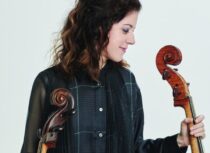
Elinor Frey, cello
Elinor Frey is a leading Canadian-American cellist, gambist, and researcher. Her albums on the Belgian label Passacaille and Canadian label Analekta – many of which are world premiere recordings – are the fruit of long collaborations with artists such as Suzie LeBlanc, Marc Vanscheeuwijck, and Lorenzo Ghielmi, as well as with composers including Maxime McKinley, Linda Catlin Smith, Christian Mason, and Lisa Streich. Elinor’s recording of cello sonatas by Giuseppe Clemente Dall’Abaco received a Diapason d’Or and her critical editions of Dall’Abaco’s cello music is published in collaboration with Walhall Editions. Early Italian Cello Concertos, her album in collaboration with Rosa Barocca orchestra, won the 2023 JUNO Award for Classical Album of the Year (small ensemble).
Elinor is the artistic director of Accademia de’ Dissonanti, an organization for performance and research, and she has performed throughout the Americas and in Europe in recital and with numerous chamber ensembles and orchestras (Constantinople, Les idées heureuses, Il Gardellino, Tafelmusik, Pacific Baroque Orchestra, etc.). In March 2023, she performed Boccherini and Sammartini concertos with the Australian Brandenburg Orchestra.
Recipient of dozens of grants and prizes supporting performance and research, including the US-Italy Fulbright Fellowship (studying with Paolo Beschi in Como, Italy) and a recent research residency at the Orpheus Institute in Ghent, Elinor holds degrees from McGill, Mannes, and Juilliard. She teaches Baroque cello and performance practice at McGill University and the Université de Montréal and is a Visiting Fellow in Music (2020–2023) at Lady Margaret Hall, Oxford University. Frey was awarded Québec’s Opus Prize for “Performer of the Year” in 2021.
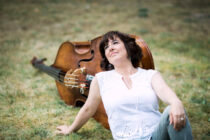
Jodi Proznick, bass
Jodi Proznick is a Canadian jazz bassist, composer, educator and producer. In 2019, she was named Jazz Artist of the Year at the Western Canadian Music Awards and has been nominated for two Juno Awards. She was also a recipient of the British Columbia Lieutenant Governor’s Arts and Music Awards in 2022.
Jodi Proznick has earned a reputation as one of Canada’s finest jazz artists. She has won numerous National Jazz Awards, including Bassist of the Year in ’08 and ’09. Her group, the Jodi Proznick Quartet, was awarded the Acoustic Group of the Year and Album of the Year in ‘08 and the Galaxie Rising Star at the Vancouver International Jazz Festival in ‘04.
In addition to leading her own group, Jodi has performed with many of Canada’s top jazz musicians, including PJ Perry, Don Thompson, Kirk MacDonald, Guido Basso, Oliver Gannon, Dee Daniels, Phil Dwyer, and Laila Biali. She is regularly in demand to perform and record with visiting jazz artists including Michael Bublé, Byron Stripling, Michael Feinstein, David “Fathead” Newman, Bucky Pizzarelli, Ed Thigpen, Jeff Hamilton, Peter Bernstein, Charles McPherson, Seamus Blake, George Coleman, Sheila Jordan, Mark Murphy, Harold Mabern, Eric Alexander, Jim Rotundi, Eddie Daniels, Jeff Hamilton and Lewis Nash.
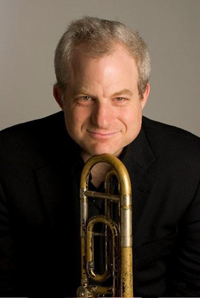
Jeremy Berkman, sackbut
Tenor Sackbut player Jeremy Berkman was first inspired to learn the trombone through listening to recordings of Gabrielli Canzoni every holiday season growing up. Despite also spending time when young learning to play alto recorder, it is more modern music that overtook his education and led him to complete degrees in music at Oberlin Conservatory and the Juilliard School. He currently holds leading positions with Vancouver Opera’s Orchestra, A Touch of Brass Quintet, the Jill Townsend Big Band, cellist Peggy Lee’s sexet (The Peggy Lee Band) and Turning Point Ensemble, where he also serves as Director of Education and Community Engagement. Honoured with Vancouver’s Mayor’s Award for music in 2011, Jeremy has found in Vancouver a community of entrepreneurial, creative, and talented colleagues with whom he has joined to participate and in some cases produce numerous incredibly inspiring musical and interdisciplinary efforts. He is very thrilled to be invited by Jacob Gramit to participate in this Lutheran Vespers for Troubled Times production, and find in its music-making the circles of life and truth.
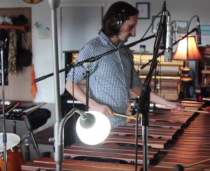
Gregory Samek, percussion
Gregory Samek completed a Bachelor of Music Education at the University of Windsor in 2006 and a Master of Music in Performance at the University of Toronto in 2008. After graduating he joined the percussion ensemble Scrap Arts Music and toured North America, Europe, and Asia until 2017. He has also been a member of the National Youth Orchestra of Canada, the Band of the Ceremonial Guard, a Montreal-based Marimba duo, a Toronto-based percussion trio, and has had the opportunity to study for two years at the Banff Centre for the Arts. He currently resides in Vancouver where he continues working on solo projects and collaborations with local musicians.
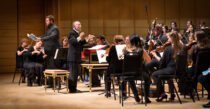
Pacific Baroque Orchestra
The ‘house band’ of Early Music Vancouver, The Pacific Baroque Orchestra (PBO) is recognized as one of Canada’s most exciting and innovative ensembles performing “early music for modern ears.” Formed in 1990, the orchestra quickly established itself as a force in Vancouver’s burgeoning music scene with the ongoing support of Early Music Vancouver. In 2009, PBO welcomed Alexander Weimann as Director. His imaginative programming, creativity and engaging musicianship have carved out a unique and vital place in the cultural landscape of Vancouver.
PBO regularly joins forces with internationally-celebrated Canadian guest artists, providing performance opportunities for Canadian musicians while exposing West Coast audiences to a spectacular variety of talent. The Orchestra has also toured throughout BC, the northern United States, and across Canada. Their 2019 East Coast Canadian tour with Canadian soprano Karina Gauvin culminated in a critically acclaimed album, Nuit Blanches, released by Atma Classique.


